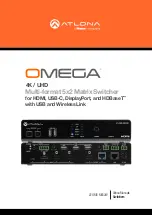
19
ACL C
ONFIGURATION
This chapter covers the following topics:
■
Brief Introduction to ACL
■
QoS Configuration
■
QoS Profile Configuration
■
ACL Control Configuration
■
ACL Control Configuration
Brief Introduction to
ACL
A series of matching rules are required for the network devices to identify the packets
to be filtered.
After identifying the packets, the Switch can permit or deny them to
pass through according to the defined policy.
Access Control List (ACL) is used to
implement such functions.
ACL classifies the data packets with a series of matching rules, including source
address, destination address and port number, and so on.
The Switch verifies the data
packets with the rules in ACL and determines to forward or discard them.
The data packet matching rules defined by ACL can also be called in some other cases
requiring traffic classification, such as defining traffic classification for QoS.
An access control rule includes several statements. Different statements specify
different ranges of packets. When matching a data packet with the access control
rule, the issue of match order arises.
The case of filter or classify the data transmitted by the hardware
ACL can be used to filter or classify the data transmitted by the hardware of the
Switch. In this case, the match order of the ACL’s sub-rules is determined by the
Switch hardware. The match order defined by the user will not be effective.
The case includes: ACL cited by QoS function, ACL used for filter the packet
transmitted by the hardware and so on.
The case of filter or classify the data transmitted by the software
ACL can be used to filter or classify the data treated by the software of the Switch. In
this case, the match order of ACL’s sub-rules can be determined by the user. There are
two match-orders:
config
(by following the user-defined configuration order when
matching the rule) and
auto
(according to the system sorting automatically when
matching the rule, that is in depth-first order). Once the user specifies the
match-order of an access control rule, it cannot be modified later, unless all the
content is deleted and the match-order specified again.
The case includes: ACL cited by route policy function, ACL used for control logon
user, and so on.
Summary of Contents for 5500 SI - Switch - Stackable
Page 24: ...24 ABOUT THIS GUIDE...
Page 50: ...50 CHAPTER 1 GETTING STARTED...
Page 54: ...54 CHAPTER 2 ADDRESS MANAGEMENT CONFIGURATION...
Page 78: ...78 CHAPTER 3 PORT OPERATION...
Page 88: ...88 CHAPTER 4 XRN CONFIGURATION...
Page 122: ...122 CHAPTER 8 VLAN VPN CONFIGURATION...
Page 216: ...216 CHAPTER 15 SSH TERMINAL SERVICES...
Page 268: ...268 CHAPTER 16 IP ROUTING PROTOCOL OPERATION...
Page 308: ...308 CHAPTER 17 NETWORK PROTOCOL OPERATION...
Page 349: ...349...
Page 350: ...350 CHAPTER 18 MULTICAST PROTOCOL...
Page 522: ...522 CHAPTER 22 FILE SYSTEM MANAGEMENT...
Page 584: ...584 CHAPTER 30 PASSWORD CONTROL CONFIGURATION OPERATIONS...
Page 600: ...600 CHAPTER 31 MSDP CONFIGURATION...
Page 614: ...614 CHAPTER 32 CLUSTERING...
Page 670: ...670 CHAPTER C AUTHENTICATING THE SWITCH 5500 WITH CISCO SECURE ACS...
















































